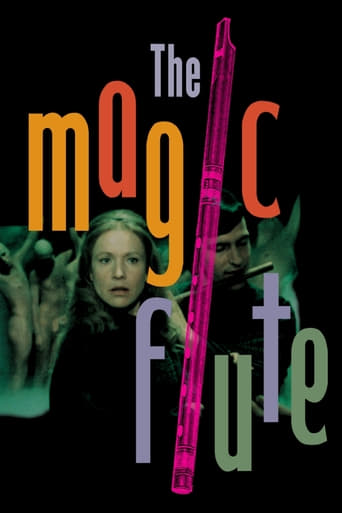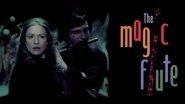gavin6942
The Queen of the Night offers her daughter Pamina to Tamino, but he has to bring her back from her father and priest Sarastro. She gives a magic flute to Tamino and magic bells to the bird hunter Papageno, who follows Tamino and wants to find a wife. The duo travels in a journey of love and knowledge.We can tell this story was eating at Bergman's soul for a long time. During the 1960s Magnus Enhörning, head of the Swedish Radio, asked Bergman for possible projects and the director replied "I want to do The Magic Flute for television". Enhörning readily agreed and supported the project without hesitation. The characters of Frid and Petra in "Smiles of a Summer Night" (1955), and Johan and Alma in "Hour of the Wolf" (1968) pre-figure his conception of Papageno and Papagena, and Tamino and Pamina respectively in "The Magic Flute". The latter film includes a puppet-theater sequence of part of Act 1 of the opera.I am not a huge opera fan by any means, and I appreciate the way Bergman did this. The whole showing the audience thing? The intermission with the actors being themselves? The use of sets? It is like inviting us out to a real opera without all the stuffy, socially awkward moments that may occur. Most people probably would have cut the music and adapted the story into a movie script. This actually seems better, more pure. We get all the best of a real show without having to go to one or pay the high ticket prices.
blanche-2
Mozart's final opera, The Magic Flute, gets the Ingmar Bergman treatment in this 1975 film.One of the most beautiful operas ever written, The Magic Flute is infused with Masonic symbolism and odd twists to the story - the people we think are good (Queen of the Night and the Three Ladies) aren't, and vice versa. Sarastro (Ulrik Cold) supposedly is holding the Queen's (Birgit Nordlin) daughter Pamina (Irma Urrila) captive, and the Queen, in a magnificent aria, implores Tamino (Joseph Kostlinger) to save her and promises her in marriage if he succeeds. There is also the birdcatcher, Papageno (Hakan Hagegard), whom he meets along the way, and three boys who serve as guides. The three boys are one of the best parts of the film.Bergman sets up the production as a staged opera, and often focuses on a little girl in the audience and her reactions. I especially loved his use of an air balloon in several scenes - he also uses outdoor footage, particularly before Pamina's suicide attempt. And Bergman's ending, showing Papageno and Papagena, is wonderful.Though this opera is beautifully realized by Bergman, I have seen and heard The Magic Flute (as well as sung it) too many times to have enjoyed most of the singing. Despite some of the magnificent voices to come out of Sweden, the casting here was based on age and physical correctness for the role. Hagegard, Kostlinger, and Urrila come off the best, but in the brutally difficult role of the Queen, Birgit Nordlin falls short - it's my understanding the high Fs were dubbed. The boys were wonderful. In the end, I much prefer to Gedda-Janowitz-Popp recording from years ago.I once took a master class from the head of the Zurich Opera, who said that Americans are often too careful and precious with Mozart, when in fact, when The Magic Flute debuted, it was like Holiday on Ice! The music is so heavenly, the characters of Papageno and Papagena so accessible, that one can really believe it.The Magic Flute, here done in Swedish, is musically a perfect opera, with the soaring "Dies Bildnis," the tremendous Queen of the Night arias, the soulful "Ach, Ich fuhls," the beautiful Pamina-Papageno duet, the attempted suicide scene with Pamina and the three boys, the delightful Papageno-Papageno duet, and the God-like intonings of Sarastro.This is a great way to introduce opera to a novice, and a great opera with which to do it, despite all the layers in the story. Just listen to the music, and become a convert.
marissas75
Some opera-buff acquaintances of mine have called Ingmar Bergman's movie of "The Magic Flute" the only good opera film ever made. While I don't know enough about opera to be able to accurately judge that, this movie is certainly a delightful experience. Sung in Swedish by a cast of photogenic Scandinavians, the film both looks and sounds wonderful.With its fairy-tale plot and passages of spoken dialogue in addition to singing, "The Magic Flute" is already a very accessible opera. Bergman accentuates this by taking an unpretentious "Opera for Everyone" approach, exemplified by his close-up shots of audience members' faces as the overture plays. His production mostly has an 18th-century rococo/ Neoclassical look, though there are a few jarringly modern touches, such as writhing dancers in the last scene. Other than that, this seems a pretty faithful (if shortened) version of the opera that captures its comedy as well as its serious themes.Mozart's music is both gorgeous and character-appropriate: lyrical arias for aristocratic lovers Tamino and Pamina, powerful coloratura for the vengeful Queen of the Night, folksy melodies for the bird-catcher Papageno. Papageno, a lovable Everyman type, is probably my favorite character in the opera, and Hakan Hagegard does the role justice. Ingmar Bergman's movies are known for their focus on human psychology, and even though "The Magic Flute" is a fantasy, the cast members make their actions believable. They do not just stand and sing like divas; they become tangible human beings.This collaboration across the centuries between two great artists, Mozart and Bergman, yielded a lovely result. Highly recommended for novice opera-watchers and serious opera buffs alike--though I'm sure many opera fans have already seen this treat of a movie.
Ed
I have mixed feelings about this film some of which include a great deal of irritation. Let's deal with the opera first: the libretto by Mozart's fellow Mason, Schikaneder, is not in the same league with those of Mozart's most famous librettist Lorenzo Da Ponte (Cosi Fan Tutte, The Marriage of Figaro, Don Giovanni.). In fact, it's downright silly in places, even allowing for the Masonic symbolism. By present-day standards, it is also quite sexist. Sarastro has abducted Pamina from her mother "The Queen of the Night" and tells her she should not be under her mother's influence but she "needs a man to guide her." (Tamino.) It is also racist: Monostatos, one of the villains, is a Moor. But we cannot expect an eighteenth century opera to be "politically correct".Of course, this opera also contains some of Mozart's (or anyone's for that matter) noblest music generally sung by Sarastro or his priests. But, due to the libretto, I find the opera a less satisfactory experience as a whole than the more realistic Da Ponte ones. (The "Flute", of course, is related to the German Singspiel with spoken dialog and is not an Italian opera with recitative.) The cast of this production is largely unfamiliar to Americans except for Håkan Hagegård, the excellent Papageno but Josef Köstlinger was also excellent as Tamino. The singing is not uniformly excellent, though, and the familiar problem of who should sing "The Queen of the Night" is not solved here. Birgit Norden, who plays the part, has too light a voice which should really be that of a dramatic coloratura. She generally gets the coloratura passages but is less successful in the longer notes which often sound shrill to me. (Mozart wrote these parts for specific singers; in this case it was one Josepha Hofer. He often changed arias when the singer changed.) Maybe her acting is also too "Lady Dracula" for me and might be more of a cold-blooded you-know-what. The Sarastro (Ulrik Cold) also seems to have a bit too light a voice for the part. And the production seems more than a little creaky though I think the Swedish translation doesn't help.The overture is played while the camera shows the utterly rapt faces of the audience especially the beatific one of a little girl and I find this particularly tedious after a while. In real life, audiences, particularly children, tend to talk or fidget through an overture, I think. The dragon (originally a snake.) which pursues Tamino at the beginning is really more funny than terrifying and makes Tamino seem like a crybaby.The later scenes I thought were generally better and dramatically more convincing. Although I agree that Bergman is probably the greatest living film director (his newest film "Saraband", from 2003, has been getting rave reviews.), I think this film has probably been rather overrated.



